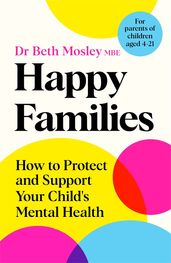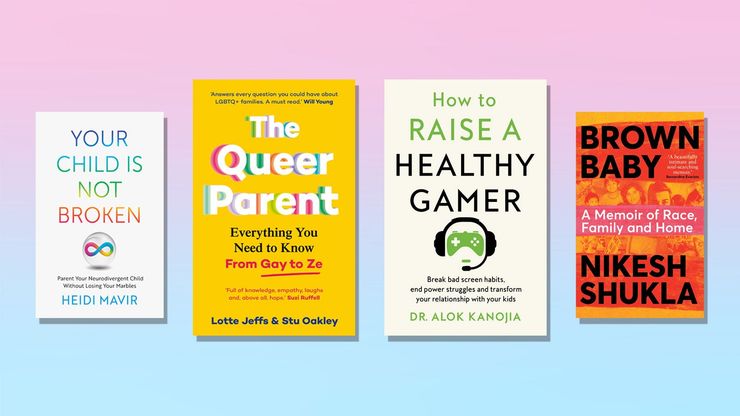How to help children deal with divorce or separation
NHS Consultant Clinical Psychologist Dr Beth Mosley on supporting children during a separation.

How can you prioritise your children's wellbeing at a time of huge emotional turmoil for you, as well as them? Dr Beth Mosley, author of Happy Families, an honest and accessible approach to children’s mental health, offers some empathetic and practical advice.
When my then-husband and I broke up nearly a decade ago, amongst the rollercoaster of extreme emotions, the one thing we did agree on was we needed to find a way to minimise the impact on our three children. We recognised that they were all at different ages, with different temperaments and approaches to change and felt anxious about how they would adjust to not living as one family together.
If you have been or are currently in this situation, the number of unknowns may be daunting, and the extreme range of emotions overwhelming. In the early days, you recognise life is likely to change significantly, but you may not be able to articulate how or when. It’s possible you will not be able to give your children the reassurance they ask for. Over time, as the dust settles and you recalibrate your life and emotional world, your child/ren will turn to you to make sense of the feelings they are experiencing.
‘How do you support your children through this time when you may not have the answers to their questions? When your emotions may be so strong you feel you cannot protect your children from them?’
So, how do you support your children through this time when you may not have the answers to their questions? When your emotions may be so strong you feel you cannot protect your children from them? As you enter into this new era with your changing family, it's important to keep the below principles in mind. By doing so, this painful time has the potential to bring new happiness and a profound understanding of the value of relationships.
How to help yourself
Your availability as a parent may be reduced as you grapple with all of the practical and emotional dilemmas of separation. This means you may find yourself less emotionally responsive to your child and/or, at other times, overreactive. The quality and quantity of your time together may be compromised, and the stress levels you are experiencing may change your approach to discipline. These changes in parenting can impact your child’s sense of security. I remember my children finding ways to try and snap me back into their world – sometimes gently 'Mummy, you’re not listening' other times with extreme melt-downs I couldn’t ignore.
Finding ways to help resource yourself during this difficult time is therefore critical to helping give you the strength to provide the care you and your child/ren need. Prioritise these ways of resourcing yourself:
- Find your cheerleaders Avoid using your children to vent. Find the people you can trust to help you make sense of and share your feelings. These people will likely provide you with the support and stability you need. They will give you a safe space to be honest about how you are feeling and coping.
- Think about how you spend your time It can be easy to get stuck in activities that encourage doom spiraling (e.g. getting caught online or in unhelpful communications). Instead, be mindful of how you spend your time. Prioritise activities that look after yourself, even if they are simple ones like going for a walk or spending an evening with a friend. You might have to force yourself to look after yourself (with what you eat, your drinking and sleep habits). Expect you may have a period when you are eating too much or too little or struggling to sleep. But as things settle this should return to normal. Be kind to yourself. The more you can do to take care of yourself, the more capacity you will have to take care of others, particularly your children.
How to help your child/ren
Just like you, your child/ren will have an emotional reaction to the breakup. They may show this in different ways depending on their age and temperament. Younger children may regress and be more needy for a while. During this time children are likely to be more sensitive to changes and less able to cope with daily demands. You may find that they experience anxiety about being away from you, periods of withdrawal and sadness, and feelings of anger that may come out in explosive behaviour – some may be directed at a parent, especially if they feel this parent is responsible for the breakup. These are all very natural responses to the range of emotions your children will be experiencing as they process and make sense of the loss of life as they have known it.
The simplest thing to remember is that your child needs you to provide warmth, stability and understanding through this life-storm. Providing them with time and space to share how they are feeling or ask you questions will be critical.
‘Being honest and providing the minimum information to help them feel informed but not overwhelmed is key. If you haven’t got all the answers, reassure them that you will keep them updated as you work out the finer details.’
Hold these key things in mind:
- You may need to explain things they are seeing so that they don’t come to the wrong conclusions, or fill in the gaps with inaccurate information. Don’t try to pretend everything is okay if you are struggling. Be honest but provide hope that things will work out.
- They will likely be hugely interested in what this means practically for them. 'Who will I live with?' 'Will we have to move?' 'Will I still be able to go to my school/clubs?' My daughter’s first question when we told them we were breaking up was: 'Who’s having the TV?'! There are some questions that you may be able to answer confidently and some you may not. Being honest and providing the minimum information to help them feel informed but not overwhelmed is key. If you haven’t got all the answers, reassure them that you will keep them updated as you work out the finer details.
- Be conscious about how you share information. Choose a good time for them and you. When you have children of different ages, you may share information with them together but have additional follow-up conversations separately. Older children may want to discuss things in more detail. Giving them your time, one-on-one, and doing a range of activities (e.g. a walk, a trip to the cinema, taking them to clubs, hanging out together watching TV) provides opportunities to share feelings and ask questions. For younger children, during play, bath or bedtime you may create space to answer questions. If you can predict tougher questions, perhaps about infidelity, it may help to think through an explanation so you can answer in a way that will be helpful to your child and not create unnecessary blame or confusion. Make it clear that your child is not in any way responsible for the difficulties.
- With high emotions, arguments, disagreements and mishandling situations are more likely. Remember the power of repair. Some of the best conversations with my kids followed a mishap where I went back to them when things were calmer and I was better resourced. I could then provide a space where I said sorry and we could talk together about what happened. I got good at explaining that when people are struggling with their feelings and big changes in their life it is natural to get easily upset, to overreact or maybe want to be alone. But, despite that, the important thing is being there for one another and finding ways to spend time together and talk. The mantra of kindness to self and kindness to others is a good one to reinforce.
If you can agree as parents that you want to prioritise your children’s wellbeing – many of the decisions and ways you communicate together can be framed around this shared commitment. Remember, in all of your choices and interactions, you have the opportunity to reinforce that both of you love your children deeply and that, despite the separation, you will continue to be their parents even if things are changing.
Happy Families
by Dr Beth Mosley MBE
Dr Beth Mosley MBE is one of the UK’s most experienced and respected consultant clinical psychologists, and she works with children, young people and their families every day. In this groundbreaking guide, she shares the answers to difficult topics such as anxiety, broaching difficult conversations, approaching mental health ups and downs, and many more. Happy Families takes an honest and accessible approach to children’s mental health, covering ages four to twenty-one, arming parents and carers with the tools they need to tackle problems, as well as the hope and reassurance to actively make a change.
You may also be interested in these books for children and young adults
You can also find children's book recommendations by age group: take a look at the 50 best books for 5-year-olds, great books for seven-year-olds, brilliant books for seven year olds, perfect reads for nine- to twelve-year-olds and our guide to the 50 best YA books to read right now.





